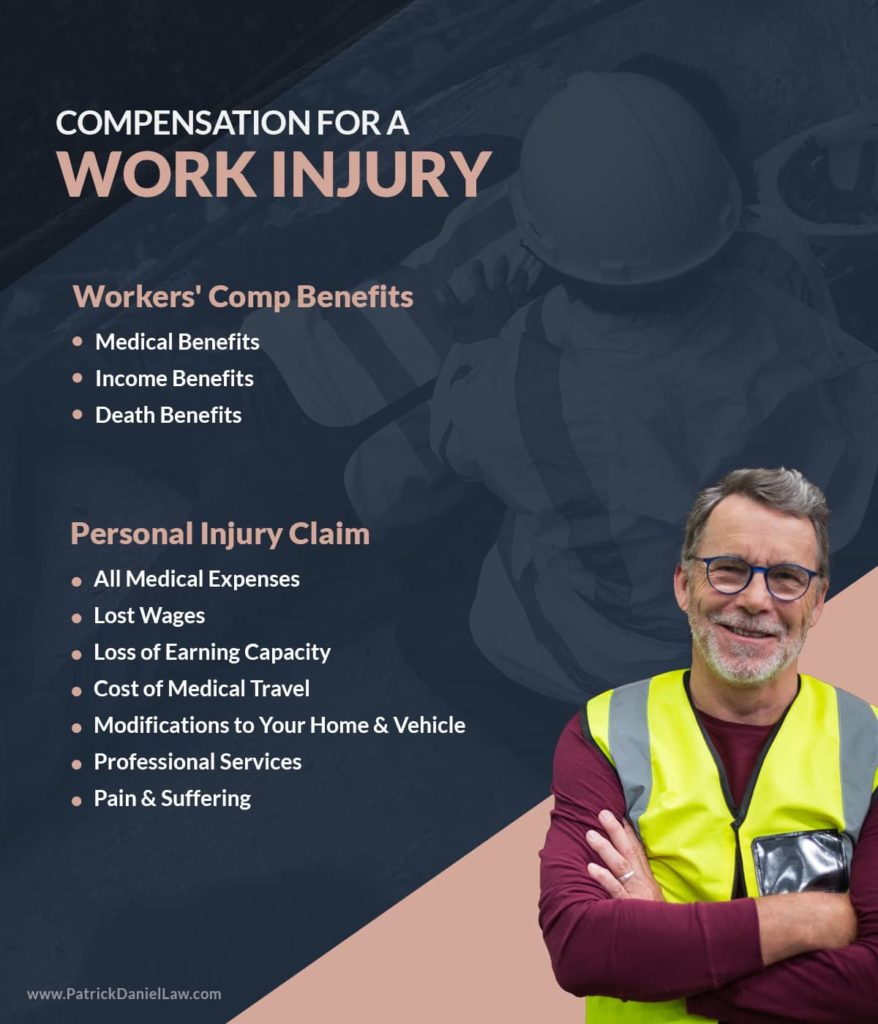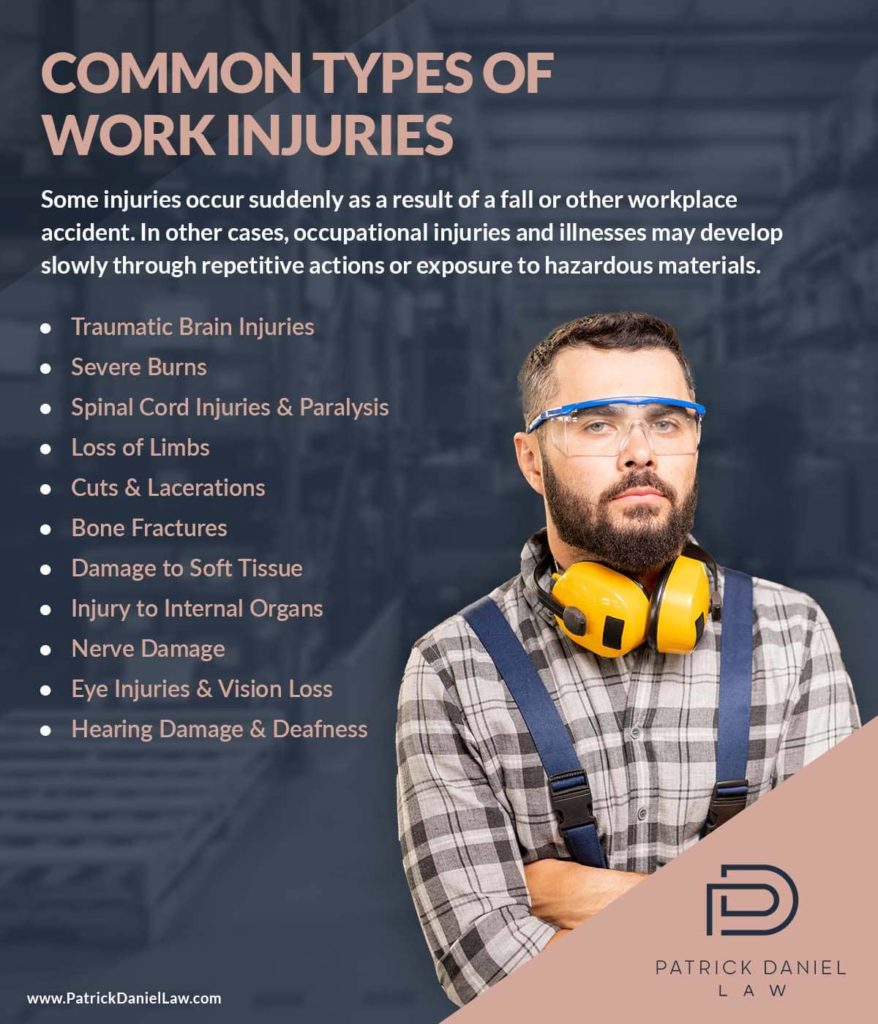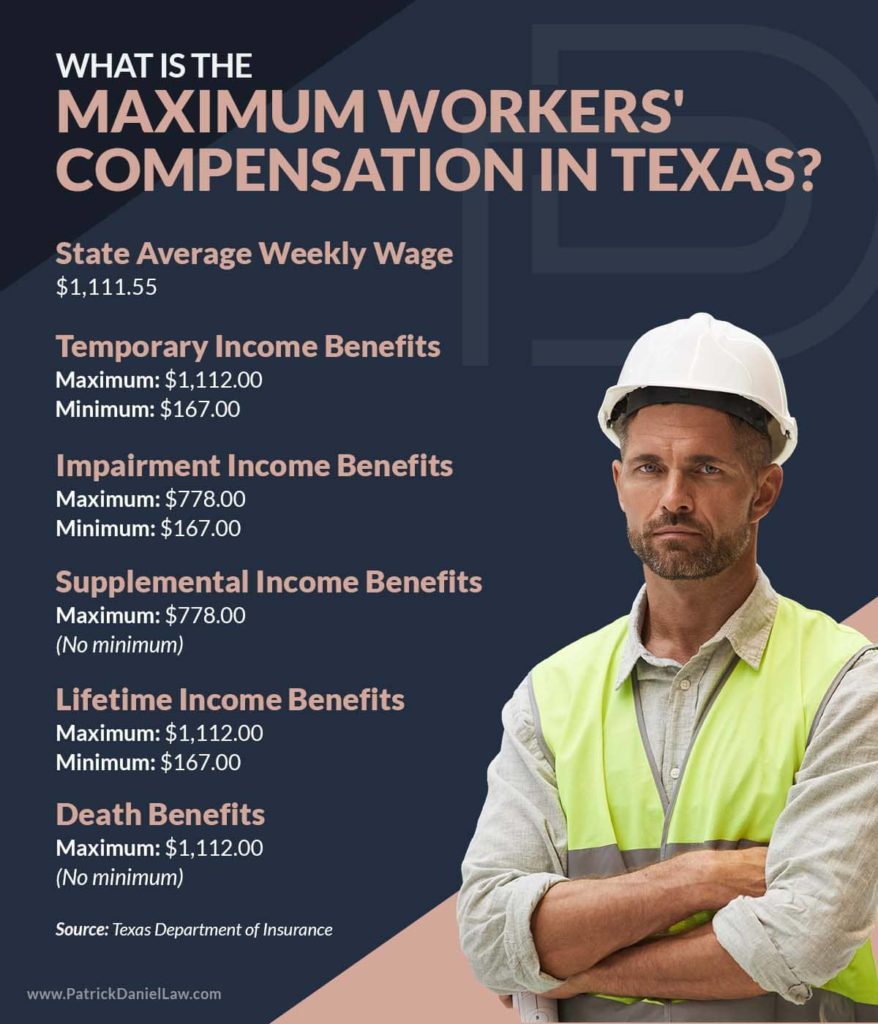Being seriously injured at work can affect multiple aspects of your life. In addition to the physical pain and limitations presented by a work injury, getting hurt on the job can impact the ability to pay your bills, your family’s financial resources, and even your ability to earn a living.
Workers in most states have the option to file a workers’ compensation claim for benefits to cover losses related to a workplace injury. However, Texas is unique in that the law does not require employers to carry workers’ compensation.
If your employer doesn’t have workers’ comp insurance, your only option may be to sue. A Texas work injury attorney can help. Please call Patrick Daniel Law at (713) 999-6666 today for a free evaluation of your rights and legal options.

Although workers’ compensation is a no-fault system (i.e., you don’t have to sue to recover damages), many workers are often unaware of the difficulties they might face in getting the benefits they deserve. So, hiring a lawyer is generally beneficial if you suffer an injury on the job, but it is especially important in Texas.
Given the possibility that your employer is uninsured (known as a “non-subscriber”), you need an attorney who can help you explore all of your options for recovering compensation. This may include filing a lawsuit against your employer and/or other negligent parties that may be responsible for your injury.

Your ability to sue for a work injury is contingent on two basic factors.
First, if your employer has workers’ compensation insurance, you are generally limited to filing a workers’ comp claim. If there is no insurance program in place, you may be able to sue.
Second, to recover compensation in a work injury lawsuit, you must prove that your employer’s negligence caused your injuries and subsequent damages. Employers have a number of legal responsibilities, such as providing a safe work environment, hiring competent employees, and providing training to help workers do their jobs safely. Breaching these duties – whether directly or through the negligence of one of your coworkers – exposes a non-subscriber employer to liability.
Provided your employer is a non-subscriber, filing suit for a work injury is the same as filing a claim for any type of personal injury. As with all legal claims, the first step you should take is to hire an attorney to help with your case.
Houston work injury lawyer Patrick Daniel will fully investigate the circumstances of the on-the-job accident to determine how it occurred and who is responsible. Our team will gather evidence on your behalf, including photos of dangerous conditions in your workplace, eyewitness testimony, and more. We will also fully assess the damages you have sustained as a result of your injuries, as well as identify your options for filing a claim.
If we determine that your employer does not have workers’ compensation insurance, the next step is assessing your right to sue.
Before filing suit, Patrick Daniel Law will draft and issue a demand letter that outlines the circumstances of the accident, the nature of your injuries, your employer’s liability, and the damages you are seeking. This may initiate negotiations between our team and your employer and/or the employer’s insurance company. Alternatively, if the opposing parties deny your claim or refuse to negotiate, we may need to file a lawsuit in the court that has jurisdiction over your case.

Although we are proud to assist employees who file for workers’ compensation, the primary focus of our practice is helping injured people pursue recovery of their damages from the parties that have wronged them. With Texas law providing no guarantee of workers’ comp benefits, this often means filing claims against negligent employers.
Serious injuries can occur in any workplace. However, some industries are inherently more dangerous, and these dangers are often exacerbated by the carelessness or wrongdoing of employers.
Patrick Daniel Law has extensive experience with the following work injury claims:
If you were injured at work in the course of your job, you have rights. Regardless of the circumstances, Patrick Daniel Law can investigate the work injury accident and pursue the full compensation and benefits you deserve.

Patrick Daniel Law has experience handling a wide variety of work injury claims. These include:
These and other injuries may arise from a multitude of different incidents and safety hazards. Some injuries occur suddenly as a result of a fall or other accident. In other cases, however, occupational injuries and illnesses may develop slowly through repetitive actions (e.g., operating a tool or machine) or exposure to dangerous materials (e.g., asbestos, chemicals, toxic fumes, etc.).
Whether the injury or illness occurs in an instant or over time, it is important to seek medical attention as soon as possible for any work-related complaint. In addition to getting an accurate diagnosis and starting necessary treatment, seeing a doctor promptly creates a record of your injury, the symptoms you have, the prognosis, and the likely cause.
All of these details are essential whether you are filing for workers’ compensation and/or bringing a claim against your employer.

For workers in most states, the question of liability does not apply to the vast majority of workplace injuries. When workers get hurt on the job, filing for workers’ comp is usually the one and only option.
Because Texas has such lax rules on workers’ compensation, employer liability is a much more common concern in Houston and other areas of the state. However, just because an employer can be sued does not mean that every case is guaranteed to succeed.
The unfortunate reality for many workers is that accidents and injuries are not always someone’s fault. Some work injuries occur despite the best efforts of workers and employers to prevent accidents. If this is the case, the injured worker will likely not be able to sue.
Without recourse to workers’ compensation, the situation above would unfortunately leave the injured worker responsible for paying all expenses related to the injury. Before resigning yourself to this situation, however, it is crucial to consider all of the factors that led to the workplace accident.
Careful investigation may reveal that the negligence of one or more third parties caused your injuries. Potential examples include:
Third-party liability claims are no less challenging than filing suit against an employer. Patrick Daniel Law is Strategic, Meticulous, and Merciless. We identify all of the parties whose negligence caused your work injuries, and we aggressively pursue the full compensation you and your loved ones deserve.
If your employer has workers’ compensation insurance, this does not prevent you from filing suit against one or more negligent third parties. Considering the limitations of workers’ comp benefits, exploring this option is essential in some situations for maximizing your recovery.
There are a number of important steps you need to take if you get hurt on the job. Doing the following is essential not only for your safety and well-being but to protect your legal rights:
Whether you just require first aid or you need to go to the hospital, the first step is getting treatment for an injury or illness related to your work. Unless it’s a minor bruise or scrape, you should not just try to “walk it off.” Ignoring the problem only makes things worse.
Prompt diagnosis and treatment is essential for any type of physical trauma, a repetitive stress injury, or symptoms consistent with an occupational disease or illness. Going to the doctor or emergency room ASAP is the best way to minimize the time you miss from work, as well as reduce the risk of potential complications from an injury or illness.
Finally, you need thorough medical documentation of the work injury or illness to get the compensation you deserve. This is true whether you qualify for workers’ comp and/or have to file a third party claim or claims.
Ideally you will be able to tell a manager, supervisor, or other person in authority that you have been hurt before leaving work to get treatment. Alternatively, you can have a coworker do this for you if you are incapacitated or need to be taken to the hospital right away.
Verbally notifying your employer is a good start. However, it isn’t the only thing you need to do to ensure that the accident is properly reported (see below).
If your employer has workers’ compensation insurance, you will need to see a doctor in the workers’ compensation health care network. When you go to the doctor’s office or the hospital, you should inform the staff and make a note on any intake forms that the injury, illness, or other complaint is related to your employment. You will also need to provide the following:
The physician you see for your work injury serves as your treating doctor. He or she will supervise your care and advise you when you may be able to return to work.
If your employer does not have workers’ comp insurance, you can see the doctor of your choice. At your first appointment, be sure to tell the doctor about the nature of your work so he or she can manage your care appropriately (especially as it pertains to whether you can work while you are recovering).
You need to report an injury or illness to your employer no more than 30 days after the fact to maintain your right to workers’ compensation benefits. The report must be made in writing and describe how the injury occurred in the course of your work.
It is important to be honest but factual when reporting a work-related injury or illness. Do not speculate or say anything to suggest that you may have been at fault. Any inaccuracies or embellishments may be used against you by your employer and/or the insurance company.
To apply for workers’ comp, you will need to complete form DWC-041 and submit it to the Texas Division of Workers’ Compensation Insurance. This must be done within 1 year of sustaining an injury on the job or developing a condition or illness related to your work.
As with reporting the injury to your employer, it is crucial to stick to the facts and be as accurate as possible when filling out the claim form. If you are unsure how to answer any of the questions or you are concerned about making a mistake, it may be in your best interest to speak to an attorney.

Being injured at work creates a number of hardships. The physical pain of an injury is often exacerbated by the uncertainty of how your ability to work and support your family will be affected.
You don’t have to go it alone. Houston workers’ compensation lawyer Patrick Daniel will protect your rights and provide you with guidance and support at every stage of your claim.
There is no reason not to seek legal guidance after a workplace injury. At Patrick Daniel Law, we handle cases on a contingency basis. There is no charge for your initial consultation, and you don’t owe us a fee unless we achieve a favorable result.
Our team is committed to success in your case. We fight for maximum workers’ compensation benefits and explore any additional claims you may have if a third party’s negligence caused you harm.
Texas law does not allow for the settlement of a worker’s medical benefits under workers’ compensation. Workers are entitled to ongoing coverage of expenses for “reasonable and necessary medical care” under the employer’s workers’ compensation insurance. A settlement may be reached, however, for income benefits.
A settlement cannot be made until the worker attains maximum medical improvement (MMI). MMI is defined by the Texas Department of Insurance as the point at which “the employee is as well as he or she is going to be after treatment” as determined by a healthcare provider.
Unlike many states, workers’ compensation settlements cannot be paid in a lump sum (i.e., all at once) except in the following situation:
“An employee may elect to commute the remainder of the impairment income benefits to which the employee is entitled if the employee has returned to work for at least three months, earning at least 80 percent of the employee’s average weekly wage.”
If the insurance company offers to settle your claim, it is in your best interest to consult a Houston workers’ compensation attorney as soon as possible. A lawyer can ensure that the settlement will adequately cover your costs long-term after a work injury or illness. Ultimately, the settlement will need to be approved by the Commissioner of Workers’ Compensation.
The state average weekly wage and maximum and minimum benefits are adjusted each year. For fiscal year 2023 (beginning October 1, 2022, and ending September 30, 2023), the workers’ compensation benefits rates are calculated as follows:
Source: Texas Department of Insurance
A worker is considered to have attained maximum medical improvement (or MMI) when one of the following occurs:
Temporary income benefits (TIBs) expire once you reach MMI. However, you may qualify for income impairment benefits (IIBs). Your entitlement to IIBs depends on the impairment rating assigned by your doctor.
The impairment rating (or IR) is determined through a specialized medical exam designed to ascertain what (if any) permanent damage was caused by a work injury or illness. Your eligibility for income impairment benefits (IIBs) is subject to the state guidelines for assessing the impairment rating (see Texas Workers’ Compensation Act § 408.124).
After examining you, the doctor will use these guidelines to calculate your impairment rating. The doctor will then prepare a report certifying that you have reached maximum medical improvement and stating your impairment rating.
The impairment rating is expressed as a percentage representing the impairment to your body as a whole. How long you are eligible to receive income impairment benefits depends on your impairment rating. You are entitled to 3 weeks of IIBs for every IR percentage point.
Workers can dispute a doctor’s certification of maximum medical improvement and/or the assigned impairment rating. A Houston workers’ compensation lawyer can help you file the dispute.
One of the biggest differences between workers’ compensation and personal injury law is the types of recoverable damages. Workers’ compensation benefits are limited to the following:
Most workers’ comp benefits are subject to limitations. The emphasis of the program is to get workers back to work, not to make up for the totality of losses associated with a work injury.
When you file a lawsuit against your employer for a work injury, on the other hand, you can pursue compensation for all of the damages you have sustained. You may be entitled to compensation for the following:
In addition to these economic losses, you may be entitled to recovery of non-economic damages. Work injuries often result in chronic pain, disability, scarring and disfigurement, and other adverse impacts on your quality of life. At Patrick Daniel Law, our work injury attorneys assess the evidence and consult experts to add up all of these damages on your behalf.
Pain and suffering is one of the most notable types of damages in any personal claim. These damages compensate injury victims for the emotional and psychological trauma stemming from an accident.
Workers’ compensation makes no provision for pain and suffering. However, in cases where a negligent employer causes an accident and the worker is able to file suit, pain and suffering damages can and absolutely should be accounted for as part of the claim.
Damages for pain and suffering do not have a precise monetary value. As a result, insurers will typically not offer fair compensation for these losses. Patrick Daniel Law meticulously examines all of the ways that a work injury affects your life – physically, mentally emotionally, and financially. Our rigorous investigation enables us to present compelling evidence of pain and suffering and other damages.

Another major difference between workers’ compensation claims and lawsuits for work injury is the length of time workers and their families have to take action. In Texas, the statute of limitations for any personal injury claim (including those involving workplace accidents) is 2 years from the date of the injury.
Injured workers have even less time to file for workers’ comp benefits. Not only are claims subject to a 1-year time limit, but workers must report the injury to their employer no later than 30 days after an on-the-job accident.
Prompt legal action is crucial whether your employer has workers’ compensation insurance or not. The Houston work injury lawyers Patrick Daniel and the entire team at Patrick Daniel Law are committed to taking swift action on your behalf to preserve all of your options for filing a claim.
Work injury claims in Texas are complicated matters. The lack of mandatory workers’ compensation requirements leaves many workers with limited options if they are hurt on the job. Although you may be able to file a lawsuit against an employer and/or other third parties, proving negligence can be challenging without qualified legal support.
The team at Patrick Daniel Law is Strategic, Meticulous, and Merciless when it comes to protecting the rights of workers and pursuing maximum compensation on their behalf. Attorney Patrick Daniel is recognized as one of America’s Top 100 High Stakes Litigators in a number of practice areas related to workplace injury litigation, including construction accidents, maritime law, and railroad worker/FELA claims.
For a free case evaluation, please call Patrick Daniel Law at (713) 999-6666 today. Our Texas work injury lawyers serve clients throughout the state and nationwide.
 Top Truck Accident Lawyer in Pasadena
Top Truck Accident Lawyer in Pasadena Best of The Best Attorneys
Best of The Best Attorneys Best of the Best Houston Chronicle 2021
Best of the Best Houston Chronicle 2021 Best Motorcycle Accident Lawyers in Houston 2021
Best Motorcycle Accident Lawyers in Houston 2021 American Association for Justice Member
American Association for Justice Member The National Trial Lawyers 2016 – (Top 40 under 40)
The National Trial Lawyers 2016 – (Top 40 under 40) Multi-Million Dollar Advocates Forum 2016 (Top Trial Lawyer)
Multi-Million Dollar Advocates Forum 2016 (Top Trial Lawyer) Million Dollar Advocates Forum 2019 (Top Trial Lawyer)
Million Dollar Advocates Forum 2019 (Top Trial Lawyer) America’s Top 100 Attorneys 2020 (High Stake Litigators)
America’s Top 100 Attorneys 2020 (High Stake Litigators) Lawyers of Distinction 2019, 2020 (Recognizing Excellence in Personal Injury)
Lawyers of Distinction 2019, 2020 (Recognizing Excellence in Personal Injury) American Institute of Personal Injury Attorneys 2020 (Top 10 Best Attorneys – Client Satisfaction)
American Institute of Personal Injury Attorneys 2020 (Top 10 Best Attorneys – Client Satisfaction) American Institute of Legal Advocates 2020 (Membership)
American Institute of Legal Advocates 2020 (Membership) Association of American Trial Lawyers 2018 - Top 100 Award recognizing excellence in personal injury law
Association of American Trial Lawyers 2018 - Top 100 Award recognizing excellence in personal injury law American Institute of Legal Professionals 2020 (Lawyer of the Year)
American Institute of Legal Professionals 2020 (Lawyer of the Year) Lead Counsel Verified Personal Injury 2020
Lead Counsel Verified Personal Injury 2020 The Houston Business Journal 2021
The Houston Business Journal 2021